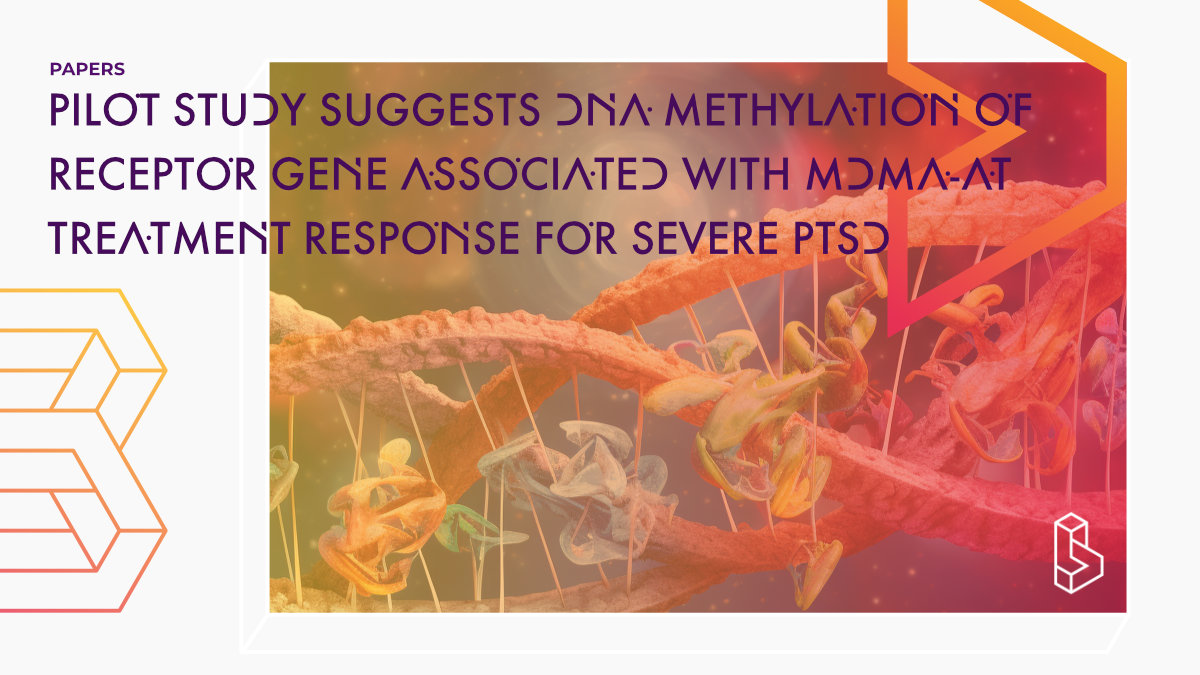This pilot sub-study (MDMA, n=16; placebo, n=7) examined epigenetic changes in three hypothalamic-pituitary-adrenal (HPA) genes before and after MDMA-assisted therapy for post-traumatic stress disorder (PTSD). Methylation changes at 37 out of 259 CpG sites predicted symptom reduction, with one site in the NR3C1 gene showing greater methylation change in the MDMA treatment group compared to placebo. These findings suggest that DNA methylation changes in HPA genes may be associated with therapy-related improvements in PTSD symptoms, particularly in those receiving MDMA-assisted therapy.
Abstract of Pilot study suggests DNA methylation of receptor gene associated with MDMA-AT treatment response for severe PTSD
“Background: Previous research has demonstrated that epigenetic changes in specific hypothalamic-pituitary-adrenal (HPA) genes may predict successful psychotherapy in post-traumatic stress disorder (PTSD). A recent Phase 3 clinical trial reported high efficacy of 3,4-methylenedioxymethamphetamine (MDMA)-assisted therapy for treating patients with severe PTSD compared to a therapy with placebo group (NCT03537014). This raises important questions regarding potential mechanisms of MDMA-assisted therapy. In the present study, we examined epigenetic changes in three key HPA axis genes before and after MDMA and placebo with therapy. As a pilot sub-study to the parent clinical trial, we assessed potential HPA epigenetic predictors for treatment response with genomic DNA derived from saliva (MDMA, n = 16; placebo, n = 7). Methylation levels at all 259 CpG sites annotated to three HPA genes (CRHR1, FKBP5, and NR3C1) were assessed in relation to treatment response as measured by the Clinician-Administered PTSD Scale (CAPS-5; Total Severity Score). Second, group (MDMA vs. placebo) differences in methylation change were assessed for sites that predicted treatment response.
Results: Methylation change across groups significantly predicted symptom reduction on 37 of 259 CpG sites tested, with two sites surviving false discovery rate (FDR) correction. Further, the MDMA-treatment group showed more methylation change compared to placebo on one site of the NR3C1 gene.
Conclusion: The findings of this study suggest that therapy-related PTSD symptom improvements may be related to DNA methylation changes in HPA genes and such changes may be greater in those receiving MDMA-assisted therapy. These findings can be used to generate hypothesis driven analyses for future studies with larger cohorts.”
Authors: Candace R. Lewis, Joseph Tafur, Sophie Spencer, Joseph M. Green, Charlotte Harrison, Benjamin Kelmendi, David M. Rabin, Rachel Yehuda, Berra Yazar-Klosinski & Baruch R. Cahn
Summary of Pilot study suggests DNA methylation of receptor gene associated with MDMA-AT treatment response for severe PTSD
MDMA (3,4-methylenedioxymethamphetamine)- vs. placebo with therapy in treating PTSD results in significant benefits, and gains continue to be sustained over time. Molecular studies have not examined predictors of successful MDMA-assisted therapy for PTSD.
Epigenetic alterations on hypothalamic-pituitary-adrenal (HPA) axis-related genes have been implicated in mediating adaptation to life conditions and may serve as molecular markers of brain-body health. These alterations have also been associated with the prediction and successful outcome of psychotherapy in PTSD.
Find this paper
https://doi.org/10.3389/fpsyt.2023.959590
Open Access | Google Scholar | Backup | 🕊
Cite this paper (APA)
Lewis, C. R., Tafur, J., Spencer, S., Green, J. M., Harrison, C., Kelmendi, B., ... & Cahn, B. R. (2023). Pilot study suggests DNA methylation of the glucocorticoid receptor gene (NR3C1) is associated with MDMA-assisted therapy treatment response for severe PTSD. Frontiers in Psychiatry, 14, 101.
Study details
Compounds studied
MDMA
Topics studied
PTSD
Neuroscience
Study characteristics
Original Re-analysis
Placebo-Controlled
Double-Blind
Randomized
Bio/Neuro
Participants
23
Humans
Cells
Linked Research Papers
Notable research papers that build on or are influenced by this paper
MDMA-assisted therapy for severe PTSD: a randomized, double-blind, placebo-controlled phase 3 studyThis double-blind, placebo-controlled study (n=90) finds that MDMA-assisted therapy (3x 80-120mg) is effective (d=.91, large effect size) in the treatment of PTSD. 67% of those in the MDMA-group no longer qualified for PTSD (vs 32% for the therapy-only group). This study is part of the Phase III trial to get MDMA approved by the FDA.
Linked Clinical Trial
A Multi-Site Phase 3 Study of MDMA-Assisted Psychotherapy for PTSD (MAPP1)Posttraumatic stress disorder (PTSD) is a debilitating psychiatric disorder that can develop after a traumatic life experience that severely reduces the quality of life. This multi-site, double-blind, placebo-controlled, randomized Phase 3 study assessed the efficacy and safety of MDMA-assisted psychotherapy compared to psychotherapy with placebo in participants diagnosed with at least moderate PTSD.

